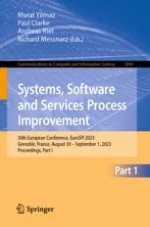This two-volume set constitutes the refereed proceedings of the 30th European Conference on Systems, Software and Services Process Improvement, EuroSPI 2023, held in Grenoble, France, in August-September 2023.
The 47 full papers presented were carefully reviewed and selected from 100 submissions. The papers are organized according to the following topical sections: SPI and emerging and multidisciplinary approaches to software engineering; digitalisation of industry, infrastructure and e-mobility; SPI and good/bad SPI practices in improvement; SPI and functional safety and cybersecurity; SPI and agile; SPI and standards and safety and security norms; sustainability and life cycle challenges; SPI and recent innovations; virtual reality and augmented reality.
